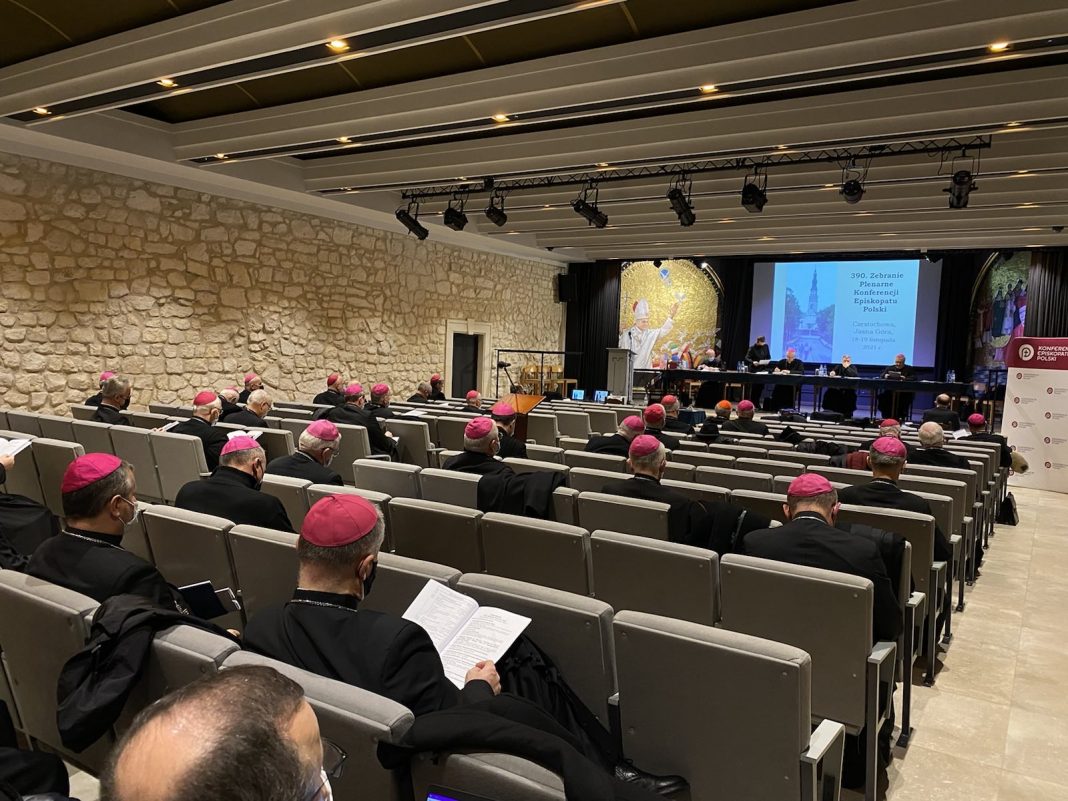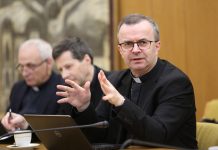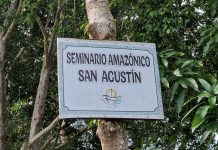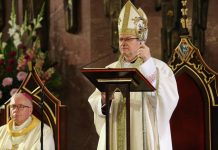The review of the visit ad limina apostolorum, the Synod of Bishops on synodality, the affairs of Polish families, and the situation on the Polish-Belarusian border – these were the main topics of the 390th Plenary Meeting of the Polish Bishops’ Conference, which was held on 18-19 November at Jasna Góra.
One of the main topics of the bishops’ meeting was the review of the visit ad limina apostolorum, which took place from 4 to 29 October, in Rome. “The most important events were the meetings with Pope Francis, during which the Pope addressed the topics indicated by the bishops, often referring to his own experience. He pointed out how to listen to the voice of one’s neighbor, conduct a humble dialogue, and create a community open to the action of the Holy Spirit, inviting at the same time to participate in building a synodal Church,” they wrote. The bishops expressed their gratitude for the ad limina visit in a letter to the Holy Father.
The bishops also devoted much attention to the Synod of Bishops on Synodality, which began on October 9th-10th of this year. The bishops see the Synod as “an invitation to listen to the voice of the Holy Spirit speaking to the Church today, in order to renew it, strengthen it, and make it more evangelical.” “The bishops warmly encourage all the faithful, clergy and laity, to courageously and actively participate in the work of the synod,” says the communiqué.
The next topic of the plenary meeting was the affairs of Polish families. The matter of preparations for the 10th World Meeting of Families with the Holy Father, which will be held on 22-26 June 2022, in Rome, was discussed. Its theme will be “Family Love: A Vocation and a Path to Holiness.” “The bishops expressed their gratitude to all those involved in the pastoral care of families, as well as to those who care for human life from conception to natural death,” says the message.
The bishops also evoked the situation on the Polish-Belarusian border. They fully supported the position expressed by the President of the Polish Bishops’ Conference, Archbishop Stanisław Gądecki, on November 10th, which strongly condemned the use of human dramas to conduct actions against Poland’s sovereignty. “The bishops recalled that in many cases migrants are victims of ruthless political action and the greed of smuggling mafias,” we read in the message. At the same time, the bishops expressed their gratitude to the uniformed services officers, the Border Guard, the Polish Army, and the Police, “who in this very difficult situation selflessly perform the duty entrusted to them to defend our borders and ensure the security of all those living on Polish territory.”
In their communiqué, the bishops stressed that “there is no contradiction in accomplishing concurrently the duty to defend our borders and to support those who have become victims of this difficult situation. There is also no internal conflict between well-understood patriotism and the need to defend our borders, and helping a neighbor in need, in the spirit of the Good Samaritan.” They also called for dialogue and reconciliation in social and political life, in the media and in public debate, and for the abandonment of hate speech and manifestations of intolerance.
Finally, the bishops asked all the faithful to pray for peace and reconciliation in our homeland. They also asked that the upcoming Advent be a time to pray for an end to the pandemic, the effects of which we are all feeling. They also renewed their earlier appeals to “prudently decide to be vaccinated for the sake of one’s own life, health, and safety and those of others.”
Press Office of the Polish Bishops’ Conference
We are publishing the full text of the Communiqué:
Communiqué from the 390th Plenary Meeting of the Polish Bishops’ Conference
On November 18th and 19th, 2021, under the leadership of Archbishop Stanisław Gądecki, the 390th Plenary Assembly of the Polish Bishops’ Conference was held at Jasna Góra.
- One of the main topics on the agenda was the summary of the recently completed visit ad limina apostolorum, which took place in Rome from 4 to 29 October. The spiritual dimension of the visit was emphasized by daily celebrations in the four major basilicas in Rome and at the tomb of St. John Paul II. The most important events were the meetings with Pope Francis, during which the Pope addressed the topics indicated by the bishops, often referring to his own experience. He pointed out how to listen to the voice of one’s neighbor, conduct a humble dialogue, and create a community open to the action of the Holy Spirit, inviting at the same time to participate in building a synodal Church. This visit was an impulse for the bishops for further deep reflection on matters that are important for the Church in Poland, a renewal of faith and an encouragement to specific pastoral activities. In a letter addressed to the Holy Father, the bishops expressed their gratitude for the paternal, substantive, and creative atmosphere of the meetings.
- Much space was devoted to the Synod of Bishops, which began on October 9th and 10th, convened under the title: For a Synodal Church: communion, participation, mission. The voice of Prof. Aleksander Bańka, who—under the mandate of the Polish Bishops’ Conference—participated in the inauguration of the Synod in Rome, was listened to attentively. The bishops see the Synod as an opportunity for deep, sincere, and shared reflection on the current situation of the Church. They also see it as an invitation to listen to the voice of the Holy Spirit speaking to the Church today, in order to renew it, strengthen it, and make it more evangelical.” “The bishops warmly encourage all the faithful, clergy and laity, to courageously and actively participate in the work of the synod. Furthermore, they invite people who are distanced, wounded, or feel marginalized or rejected. They will, moreover, be grateful for voices from outside the Catholic community that can help the Church to renew herself, to read the signs of the times, and to carry out her mission more effectively.
- The bishops further discussed the matters of Polish families. They encourage the Sunday of the Holy Family: Jesus, Mary and Joseph, which this year falls on December 26th, to be a day of renewal of marriage vows and of special prayer for married couples and families. The preparation for the 10th World Meeting of Families with the Holy Father, which will be held on 22-26 June 2022, in Rome, was also discussed. Its theme will be Family Love: A Vocation and a Path to Holiness. At the same time, there will be various forms of family gatherings in all the dioceses. The bishops expressed their gratitude to all those involved in the pastoral care of families, as well as to those who care for human life from conception to natural death. The importance of adoptive and foster families, thanks to which children can regain a normal home and the possibility of comprehensive development, was emphasized.
- The bishops analyzed the complicated situation on the Polish-Belarusian border with great attention. They fully supported the position expressed by the President of the Polish Bishops’ Conference, Archbishop Stanisław Gądecki, on November 10th, which strongly condemned the use of human dramas to conduct actions against Poland’s sovereignty. Bishops recall that, in many cases, migrants are victims of ruthless political action and the greed of smuggling mafias. At the same time, they expressed their gratitude to the uniformed services officers, the Border Guard, the Polish Army, and the Police, who in this very difficult situation selflessly perform the duty entrusted to them to defend our borders and ensure the security of all those living on Polish territory. Words of appreciation and gratitude are also expressed to the inhabitants of border towns and parishes, to the Caritas institutions operating there effectively, to the volunteers of non-governmental organizations, for the medical and humanitarian help provided to migrants who find themselves in centers for foreigners on the territory of the Republic. In this spirit, the bishops ask the rulers to effectively defend the security of our borders, families, and homes, and to take make the effort to recognize the stranger in real need and to give him the necessary support, in the spirit of the Gospel. They earnestly ask for access to those in need, both now and after the end of the state of emergency.
- The shepherds of the Catholic Church in Poland emphasize there is no contradiction in accomplishing concurrently the duty to defend our borders and to support those who have become victims of this difficult situation. There is also no internal conflict between well-understood patriotism and the need to defend our borders, and helping a neighbor in need, in the spirit of the Good Samaritan. Hence, the bishops call for dialogue and reconciliation in social and political life, in the media and in public debate, for the abandonment of hate speech and manifestations of intolerance. They ask to look for the good of every human being and to evaluate reality in the light of the Gospel. They also strongly condemn all actions characterized by contempt for both individuals and groups, such as the murder of a priest in Siedlce, the desecration and destruction of the cross in Zielona Góra, or the recent anti-Semitic behavior in Kalisz where a copy of the Kalisz Statute was burned.
- The bishops ask all the faithful to pray for peace and reconciliation in our homeland. May the approaching time of Advent once again be an opportunity for personal conversion and works of mercy. May it also be a time to pray for an end to the pandemic, the effects of which we are all feeling. The bishops renew their earlier appeals to prudently decide to be vaccinated for the sake of one’s own life, health, and safety and those of others. They also thank all those who care for the sick with dedication. They entrust all compatriots in the country and abroad, giving them a pastoral blessing to the intercession of the Our Lady in Jasna Góra and to the new Polish blesseds.
Signed by the shepherds of the Catholic Church in Poland present at the 390th Plenary Assembly of the Polish Bishops’ Conference
Jasna Góra, 19 November 2021
Translated by: Sr. P. Nau/Office for Foreign Communication of the Polish Bishops’ Conference

 English
English







